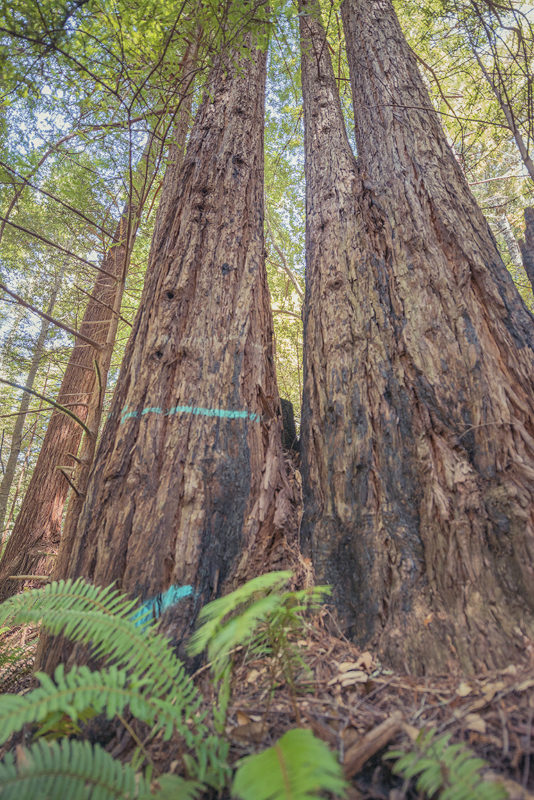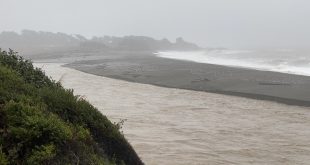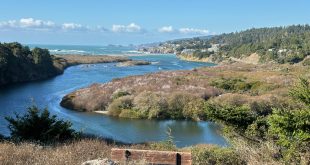Media Release
October 19, 2018
Sonoma County Superior Court once again has ruled in favor of Friends of Gualala River (FoGR) in its lawsuit against CAL FIRE’s approval of logging of coastal floodplain redwood forest in hundreds of acres of the Wild and Scenic Gualala River. The controversial “Dogwood” timber harvest plan (THP) proposed by Gualala Redwoods Timber LLC has been opposed by public protests, petitions, and litigation since 2015.
On October 16, 2018, Judge René Chouteau concluded that the second Dogwood THP failed to meet California Environmental Quality Act (CEQA) requirements for evaluating project alternatives with less environmental impact, and for assessing cumulative environmental impacts to the river, forest and floodplain, in addition to those from the Dogwood THP itself.
FoGR, Forest Unlimited, and California Native Plant Society previously sued CAL FIRE over similar environmental review flaws in the first Dogwood THP (1-15-042), and prevailed in case SCV 259216, requiring CAL FIRE to revoke the permit to log “Dogwood” in March, 2017. The applicant, Gualala Redwoods Timber (GRT), resubmitted the logging plan with minimal corrections, and CAL FIRE again approved it over major public opposition on March 30, 2018. FoGR again sued over the same basic flaws in CAL FIRE’s environmental review process for “Dogwood II” in case SCV 262241.
In agreement with legal precedents, the Court stated in “Dogwood II” that it is “absolutely clear” that THPs must be functionally equivalent to Environmental Impact Reports (EIRs). THPs must meet the same fundamental standards of CEQA with regard to evaluation of alternatives that reduce impacts to the environment, which the Court reaffirmed is “one of the most important functions of an EIR.” The Court ruled that CAL FIRE’s position on THP requirements for alternatives analysis was incorrect, and its discussion of alternatives for Dogwood simply presented no information, analysis, or explanation of how it reached its conclusions in rejecting all alternatives as infeasible. FoGR argued that CAL FIRE uncritically accepted the prejudicial arguments of the applicant, Gualala Redwoods Timber, in rejecting alternatives without analysis.
Once again, the Court ruled that CAL FIRE failed to assess cumulative environmental impacts to the Gualala River and its watershed in accordance with requirements of CEQA. The basic flaw in CAL FIRE’s analysis was a lack of a reasoned discussion for the basis of its conclusions, the Court ruled, consistent with FoGR’s position that CAL FIRE jumped to conclusions of “no impact” without evidence or accounting for other impacts from past or future logging and land and water uses.
With regard to specific flaws in CEQA-equivalent analysis of rare plants, “wetlands,” and steelhead trout and coho salmon, the Court applied legal standards that “do not focus on the ‘correctness’ of a report’s environmental conclusions, but on agency (CAL FIRE) findings that are presumed to be supported by substantial evidence – the minimum requirement for CEQA compliance. On these issues, the Court gave weight to the “expertise” of findings and approvals from other state agencies (California Dept. of Fish and Wildlife, Regional Water Quality Control Board), and the adequacy of “expertise” of registered professional foresters.
CAL FIRE, formerly known as the California Department of Forestry and Fire Protection, is governed by the Board of Forestry, which is composed of members drawn from among timber industry, forestry, and environmental professionals. It has a reputation of substantial influence from the industry it regulates.
FoGR is seeking reform of CAL FIRE’s THP procedures and documents so that they actually function as efficient equivalents of CEQA Environmental Impact Reports that focus on significant environmental impacts and solutions in the public interest, not just private interests of the timber industry applicants. FoGR and its broad coalition of public citizens and organizations will continue to pursue conservation of the unique Gualala Redwood Floodplain Forest, including full consideration of alternatives that protect the most sensitive extensive wetland and floodplain habitats.
Jeanne Jackson, natural history author of “Mendonoma Sightings” and a leader in FoGR’s opposition to Dogwood, emphasized the implications of the Court’s decision regarding alternatives: “The Gualala River is the only river in Sonoma and Mendocino Counties that has not protected its mature redwood floodplain forests. Judge Chouteau asked why the alternative of conservation sale of this unique area’s sensitive habitats wasn’t considered to comply with CEQA,” she said. “GRT’s attorneys’ answer was that the owner wants to log and isn’t interested in fair market value prices for the land. The river needs its floodplain protected. GRT owns almost 30,000 acres of timberland in the Gualala River watershed. The floodplain forest in “Dogwood,” less than 400 acres, deserves to be protected from harm.”
Contact:
Edward Yates, Friends of Gualala River’s attorney, 415.990.4805
For more background information on the Dogwood THP lawsuit, visit: www.GualalaRiver.org

 Friends of Gualala River Protecting the Gualala River watershed and the species living within it
Friends of Gualala River Protecting the Gualala River watershed and the species living within it


